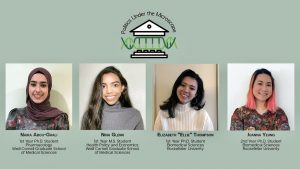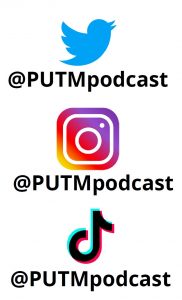Joanna Yeung
Politics Under the Microscope (PUTM) is a student-led podcast by graduate students Joanna Yeung, Ellie Thompson, Naira Abou-Ghali, and Nina Glenn. PUTM aims to capture the thought process of policy makers as they respond to complex problems and to discuss the implications those policies will have for the scientific community and broader society. On the morning of Saturday March 6, Joanna and her fellow colleagues shared their perspectives on being a part of Politics Under the Microscope.
What is PUTM? How would you describe our missions and values?
Ellie Thompson: PUTM is like an octopus because we do so many things. We advocate for the use of a scientific perspective when analyzing and discussing political, social, and contemporary issues. Through our podcast, we also aim to recruit and retain underrepresented minorities in STEM in addition to recruitment of scientists into the political landscape.
Nina Glenn: The heart of PUTM really comes back to education. Ultimately, we want to give people the tools to be well-informed citizens who can create tangible actions based on that information. Our goal is to empower people after educating them so that they can take an informed and rational viewpoint into these discussions to educate other people and to continue educating themselves.
Joanna Yeung: Not only is PUTM about educating other people but also about educating ourselves. We are all young scientists trying to learn more science policy and PUTM was the perfect excuse for me to get more involved with science policy.
How did the PUTM members all meet each other?
Naira Abou-Ghali: The Grants Office at Weill Cornell is really proactive about sending opportunities. While I was scrolling through my emails, I saw an opportunity to get funded for a science policy themed podcast through Research America. I thought starting a podcast would be the perfect way to learn about science policy, but I needed other people with me because I knew I couldn’t do it alone. I sent a message through the SEPA (Science and Education Policy Association) Slack group and I was lucky enough to have Joanna, Ellie, and Nina reply. The rest is history.
ET: Within the span of a week of meeting each other, we were able to work on the Research America grant, submit it, and actually get funded!
Out of all the episodes PUTM has produced so far, what kinds of discussions have been really inspiring or insightful to hear about?
ET: The Reverend Holt interview was the most powerful to me. As scientists, we are so focused on the lab bench. But Reverend Holt made me realize, “Will the science I do get to the people that we care about? Will it be accessible to everyone in society?” Scientists have a role with what happens with our science and how our science is used to benefit the community as a whole.
NAG: For me, it was also Reverend Holt’s interview. I can remember getting goosebumps from just her introduction. She is a black woman who was not born at a hospital because at the time, it wasn’t allowed. She takes us to the rest of her journey of advocating for the underserved and underrepresented when it comes to their healthcare. That interview highlighted the journey of one woman that had a background in science as a nurse but didn’t actually work at the bench and she is doing incredible work for equitable access. As a scientist, we can take the extra steps to advocate for policies that bring our research out there and guarantee equitable access. We are only 1500 words away from making an impact, which is the length of a policy brief. It was just an incredible perspective to hear.
NG: Something that stuck out to me in Representative Moulton’s interview was when he mentioned K through 12 education. He noted that it’s great to care about college education, but a lot of people don’t make it to that point. It’s important to invest in what’s there (scholastic resources before the undergrad/grad level). It shows how essential it is to have well-informed policy makers because they are who we point to in society.
In Representative Houlahan’s interview, she talked about how nonlinear paths in science still matter, but are not always considered when we think about the way that policies or school policies are made. For instance, what kind of support is there for a single mother in grad school? We have to think about what the broader society looks like and not just what we look like. We need to consider how we can use our personal stories to empower other people who might have entirely disparate stories but are going through a similar experience. The biggest takeaway was the ability to use policy to see these recurring themes in science and being able to connect different pieces of society together.
JY: What I really took out of the Reverend Holt interview was the prevalence of mistrust towards COVID-19 vaccines. I’ve lived in a very privileged bubble and haven’t considered that people could have mistrust towards something that I would have absolute trust towards.
In addition, [Representative] Houlahan’s interview made me think about my privilege when she talked about her experience as a grade 11 chemistry teacher. She said something along the lines of “do you know how hard it is to teach grade 11 chemistry when the students that you’re teaching have grade three to four reading level?” This made me aware of how many people don’t have access to high quality education throughout their whole lives and as a result, have difficulty with learning more complex concepts because they lack those foundational skills. It was really insightful for me to just learn about people outside of my little bubble that I exist in.
What are PUTM’s future plans?
ET: With regards to outreach plans, we have been offered [a] guest instructor opportunity with HypotheKids to teach underserved 11th and 12th graders in the New York city area about the practical applications of science.
JY: We have a lot of cool episodes in mind that we haven’t gotten to yet. One topic we are interested in covering is climate change and the policies around that. We’re also super excited about the mental health series.
NAG: We are also planning an episode series on feminism and misogyny in STEM. We would like to talk about protecting women, especially women of color in science. You read these bone chilling accounts of the way that some women of color specifically are treated in high knowledge environments and it’s just unacceptable. That is a really important thing that we have to address as well.
For more information about Politics Under the Microscope, check out our website, social media accounts, and add us to your playlist on Spotify!


